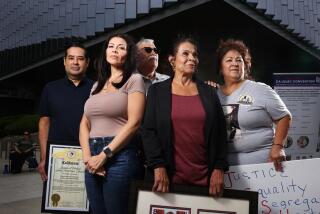If in Doubt, You Can Just Call It Albuquirky : History: New Mexico is duking it out over how to spell the city, which was named for the Duke of Alburquerque in 1706. But variations have included ‘Alburquerqui’ and ‘Alburquerq.’
- Share via
ALBUQUERQUE, N.M. — For the millionth time, it’s A-L-B-U-Q-U-E-R-Q-U-E. Maybe. Perhaps. We think. A debate that spans the centuries still flares between people who would like to see a long-dropped “r” restored, as in Alburquerque, and those who like the way things read now.
After all, it is the state’s largest city, and they ought to get the spelling straight by this time.
The two-R people were correct in the beginning.
In 1706, acting Gov. Francisco Cuervo y Valdez told the Spanish government he had decided to found an administrative center and he named it after the man who appointed him governor, Francisco Fernandez de la Cueva Enriquez, the Duke of Alburquerque.
The place he was duke of, in Spain, is a small farming town close to the Portuguese border.
Its name has remained unchanged over the centuries.
But for some reason the name Alburquerque does not travel well.
Other places named for the Spanish town, including a small community in Brazil and a group of islands in South America, near Colombia, have lost the first “r.”
*
The issue came up most recently when officials decided to use the old spelling-- “Alburquerque”-- on a pair of trolleys the city bought last year. They thought it in keeping with the historical spirit of the trolleys, which run between downtown and the city’s historical district as they did early this century.
Politicians and others saw a greater use in the debate.
Mayor Martin Chavez says the spelling debate is a great way to stir up pride for the city’s rich, multicultural history.
“It’s doing exactly what I was hoping,” Chavez said. “The idea was to get people talking. And even if nothing happens, something will happen because we’re talking about our history and elevating awareness of our past.”
Hispanic author Rudolfo Anaya supports restoring the dropped “r.” He made his preference obvious when he titled his 1992 novel “Alburquerque.” He also plans to include a map of Alburquerque, complete with the restored “r,” in his new mystery novel, scheduled for release this spring.
“I get phone calls all the time,” Anaya said. “They’re mostly positive. People say, ‘How do we start this? Can we start a club?’ ”
*
Anaya says he doesn’t have an agenda to see the change through. But his hopes were recently buoyed when state Sen. Tom Benavides of Albuquerque moved a non-binding measure through the Senate in Santa Fe asking the Albuquerque City Council to restore the dropped “r.”
The state House of Representatives is considering the same measure.
Benavides’ colleague, state Sen. Emmit Jennings of Roswell, voted against the bill because “so many of my Anglo friends have enough problems spelling Albuquerque the way it is.”
A lot of people, including tourists and letter writers, have trouble with the city’s name. But maybe most Americans became aware of the furor in the 1987 movie “Roxanne,” in which a bar debate begins after a bartender asks customers to spell the city’s perplexing name.
Cartographers, who should know, have had troubles too.
A quick tour through the Albuquerque Museum in Old Town shows several variant spellings since the area was inhabited by Spanish settlers in the early 17th Century, among them “Alburquerqui” and “Alburquerq.”
The area didn’t grow much in the 1600s, and in 1680, the Pueblo Indians led a successful revolt that tossed out the Spanish missionaries and colonists in the region. The Spanish reconquered what is now New Mexico in 1691, setting the stage for establishing Alburquerque.
In his novel “Alburquerque,” Anaya suggests Albuquerque, N.M.--nicknamed The Duke City for the old duke--lost its “r” because a train stationmaster had trouble pronouncing the extra consonant.
Historians basically agree that over the years the name changed because people had trouble saying it. The biggest debate centers on exactly who--Anglos or Hispanics--had more trouble with the pronunciation and thus is responsible for changing the name.
Novelist Anaya says the debate might bring people closer when it comes to solving modern-day issues--rapid expansion, decreasing water supplies and increasing air pollution.
“It helps us look at our identity,” Anaya said. “We have to understand and know each other if we’re to survive in a very fragile landscape.”
*
Chavez agrees. When one gets beyond the obvious levity, “you can see it touches on some very dearly held opinions and beliefs.”
Meanwhile, the city’s letterhead remains without the extra “r,” and the mail still gets to its destination, even with an extra “r” or a “u” or two in the wrong place.
Chavez, who hasn’t taken a position, said: “I was talking to a student about the name change the other day. He said, ‘Nobody can spell it the way it is now, so what’s the problem with changing it?’ I thought that was a very good point.”
More to Read
Sign up for Essential California
The most important California stories and recommendations in your inbox every morning.
You may occasionally receive promotional content from the Los Angeles Times.













